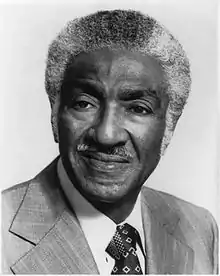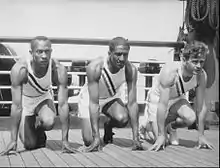Ralph Metcalfe
Ralph Harold Metcalfe Sr. (May 29, 1910 – October 10, 1978) was an American track and field sprinter and politician. He jointly held the world record in the 100-meter dash and placed second in that event in two Olympics, first to Eddie Tolan in 1932 at Los Angeles and then to Jesse Owens at the 1936 Olympics in Berlin, Germany. Metcalfe won four Olympic medals and was regarded as the world's fastest human in 1934 and 1935.[1] He later went into politics and in the city of Chicago and served in the United States Congress for four terms in the 1970s as a Democrat from Illinois.
Ralph Metcalfe | |
|---|---|
 | |
| Member of the U.S. House of Representatives from Illinois's 1st district | |
| In office January 3, 1971 – October 10, 1978 | |
| Preceded by | William Dawson |
| Succeeded by | Bennett Stewart |
| Personal details | |
| Born | Ralph Harold Metcalfe May 29, 1910 Atlanta, Georgia, U.S. |
| Died | October 10, 1978 (aged 68) Chicago, Illinois, U.S. |
| Resting place | Holy Sepulchre Cemetery |
| Political party | Democratic |
| Spouse(s) | Gertrude Pemberton (1937–1943) Madalynne Young (1947–1978) |
| Children | 1 son |
| Education | Marquette University (BPhil) University of Southern California (MA) |
| Military service | |
| Allegiance | |
| Branch/service | |
| Years of service | 1942-1945 |
| Rank | First Lieutenant |
| Battles/wars | World War II |
| Medal record | ||
|---|---|---|
| Men's Athletics | ||
| Representing the | ||
| Olympic Games | ||
| 1936 Berlin | 4×100 m relay | |
| 1932 Los Angeles | 100 meters | |
| 1936 Berlin | 100 meters | |
| 1932 Los Angeles | 200 meters | |
Track and field career
Born in Atlanta, Georgia, Metcalfe grew up in Chicago and graduated high school from Tilden Tech in 1930.[2] He accepted a track scholarship to Marquette University in Milwaukee, Wisconsin, and equaled the record of 10.3 seconds in the 100 m on a number of occasions, as well as equaling the 200 m record of 20.6 seconds. He became the first man to win the NCAA 200 m title three times consecutively.[3] At the 1932 Summer Olympics in Los Angeles, he virtually dead-heated with his rival Eddie Tolan, with the gold medal awarded to Tolan only after extended study of the photograph; both recorded a time of 10.38 seconds in the 100 meters. Metcalfe also earned a bronze medal at these games, in the 200 meters. He competed again at the 1936 Summer Olympics in Berlin, and again took silver in the 100 meters, this time behind four-time gold medalist Owens. They won gold in the 4×100 meter relay with Foy Draper and Frank Wykoff; the U.S. won by 1.1 seconds over runner-up Italy, and Germany took bronze. Fierce rivals on the track, Metcalfe and Owens (1913–1980) became lifelong friends.[4]
1932 Olympics
Metcalfe was convinced to the end of his life that the 100 m should have been awarded as a tie between him and Eddie Tolan: "I have never been convinced I was defeated. It should have been a tie"[5] Film evidence and that of observers of the race seem to support Metcalfe's verdict. The AAU later changed their rules to have the winner being the first athlete to cross the line not merely breast the tape. It was the latter that Tolan was judged to have done first. The AAU went further and awarded the race as a tie but the International Olympic Committee has never agreed to this change. They maintain the result stands because the judges decided in line with the rules at the time that Eddie Tolan's entire torso had passed the finish line on the ground before Metcalfe's.[6] In addition, even though credited with same time as Tolan, 10.3 s, a time that equaled the then world record, Metcalfe's time was never ratified as a world record.
In the 200 m, Metcalfe was embroiled in further controversy. Observers at the time claimed the marking for his starting holes were 3–4 feet behind where they should have been. Others claimed this discrepancy was the result of an optical illusion because George Simpson in the lane outside cut his holes on the outside of his lane whilst Metcalfe used the inside of his. In any case, Metcalfe was offered a re-run but refused because he feared the United States would not be able to repeat its 1-2-3.[6]
1936 Olympics

In the sprint relay, Metcalfe became involved in a controversy not of his own making. Originally the United States chose for the relay the athletes who had come 4th to 7th in the trials. Two of these athletes, Sam Stoller and Marty Glickman, were replaced with Metcalfe and Jesse Owens allegedly because they were Jewish. Metcalfe and Owens were undoubtedly the superior sprinters but they had not done the relay baton practice and the switch went against established practice.[5]
United States Championships
Metcalfe was United States Champion at 100 m between 1932-34 (and was 2nd in 1935-36) and at 200 m between 1932-36.[7]
In all he won 16 national titles at the AAU Championships, NCAA Championships and Final Olympic Trials.[5][8]
World Records
Metcalfe 16 times broke or equaled world record times at various distances. However, only 5 of these were ever officially ratified by the athletics governing body, the IAAF. The ratified times were:[9]
- equaled the world record for 100 m of 10.3 s on:
- 12 August 1933 in Budapest, Hungary.
- 15 September 1934 in Nishinomiya, Japan.
- 23 September 1934 in Darien, Japan.
- equaled the world record for 200 m (straight course) of 20.6 s on 12 August 1933 in Budapest, Hungary.
- broke the world record for the 4 × 100 m relay with 39.8 s on 9 August 1936 (United States 1936 Olympics team of Jesse Owens-Metcalfe-Foy Draper-Frank Wykoff).
Military and political career
After earning his bachelor's degree at Marquette in 1936, Metcalfe completed a master's degree at the University of Southern California in Los Angeles in 1939. Metcalfe taught political science and coached track at Xavier University in New Orleans, recruiting athletes to the University like Jimmie McDaniel. He served in the transportation corps of U.S. Army in World War II, rising to the rank of first lieutenant and awarded the Legion of Merit medal. After the war, he moved back to Chicago and later headed the state's athletic commission.
In 1955, Metcalfe won the first of four elections as an alderman representing the South Side of Chicago. He ran for an open seat in Congress in 1970 as a Democrat and was easily elected from Illinois' first district. The seat had been filled for 28 years by William L. Dawson, who was retiring at age 84 due to poor health and then died less than a week after the 1970 election. Metcalfe was a co-founder of the Congressional Black Caucus (CBC) in 1971 and later was noted for breaking ranks with Chicago mayor Richard Daley after incidents of police brutality.
Death and legacy
Metcalfe was seeking a fifth term in 1978 when he died at his Chicago home on October 10 of an apparent heart attack at age 68.[1]
Metcalfe is interred at Holy Sepulchre Cemetery in Alsip, southwest of Chicago. A federal office building in Chicago (at 77 W. Jackson Blvd.) was named for him upon its completion in 1991.[10]
Metcalfe was inducted into the National Track and Field Hall of Fame in 1975 and named a member of the President's Commission on Olympic Sports.
Personal
Metcalfe married Gertrude Pemberton on June 9, 1937 in Dallas, Texas. They divorced in Los Angeles, California in 1943. Metcalfe married Madalynne Fay Young in 1947 and they had one son.[11] He was a member of Alpha Phi Alpha fraternity, Alpha Sigma Nu honor society,[12] and the Corpus Christi parish in Chicago's Bronzeville neighborhood. He converted to Catholicism in 1932, while an undergraduate at Marquette.[13][14]
See also
References
- Bochat, Rel (October 11, 1978). "Marquette track got Metcalfe off 'n' running". Milwaukee Sentinel. p. 1, part 2.
- Kuechle, Oliver E. (March 21, 1933). "Ralph Metcalfe set high school records right and left". Milwaukee Journal. p. 4, part 2.
- 2006 NCAA Men's Outdoor Track and Field Championships Results and Records . NCAA (2006). Retrieved on 2009-09-19.
- Muwakki, Salim (October 18, 1999). "A Father's Life: Ralph Metcalfe Sr". Chicago Tribune. Retrieved March 24, 2014.
- Duncanson, Neil, "The Fastest Men on Earth", Andre Deutsch, 2011
- Henderson, Jon (June 26, 2012). "Great Olympic Moments: Tolan beats Metcalfe after dead heat at 1932 Games". The Telegraph.
- "A History Of The Results Of The National Track & Field Championships Of The USA From 1876 Through 2014". Track and Field News.
- "UNITED STATES INDOOR CHAMPIONSHIPS (MEN)". www.gbrathletics.com. Retrieved January 12, 2015.
- Imre Matrahazi (ed.). Progression of IAAF World Records 2011 Edition. IAAF Athletics. p. 500.
- "Ralph H. Metcalfe Federal Building". U.S. General Services Administration. Retrieved March 24, 2014.
- "Madalynne Y. Metcalf". Chicago Tribune. January 21, 1999. Retrieved March 24, 2014.
- Hylton, J. Gordon (September 21, 2010). "Another little-known fact: Ralph Metcalfe was a Marquette law student (at least for a while)". Marquette University Law School. faculty blog. Retrieved March 24, 2014.
- Metcalfe, Ralph H. (1938). "A Race Well Run". Catholicism.org. Retrieved March 24, 2014.
- Rhoads, Mark (November 13, 2006). "Illinois Hall of Fame: Ralph Metcalfe". Retrieved March 24, 2014. Cite journal requires
|journal=(help)
External links
| Wikimedia Commons has media related to Ralph Metcalfe. |
- United States Congress. "Ralph Metcalfe (id: M000675)". Biographical Directory of the United States Congress.
- U.S. House of Representatives history: Ralph Metcalfe
- Ralph Metcalfe at Olympics at Sports-Reference.com (archived) - Olympic results
- National Track and Field Hall of Fame
- Georgia Sports Hall of Fame
- Marquette University Athletics Hall of Fame
- Marquette University, Raynor Memorial Libraries – digital archives – Ralph Metcalfe
- Metcalfe Collection.org
- Ralph Metcalfe at Find a Grave
| U.S. House of Representatives | ||
|---|---|---|
| Preceded by William Dawson |
Member of the U.S. House of Representatives from Illinois's 1st congressional district 1971–1978 |
Succeeded by Bennett M. Stewart |
